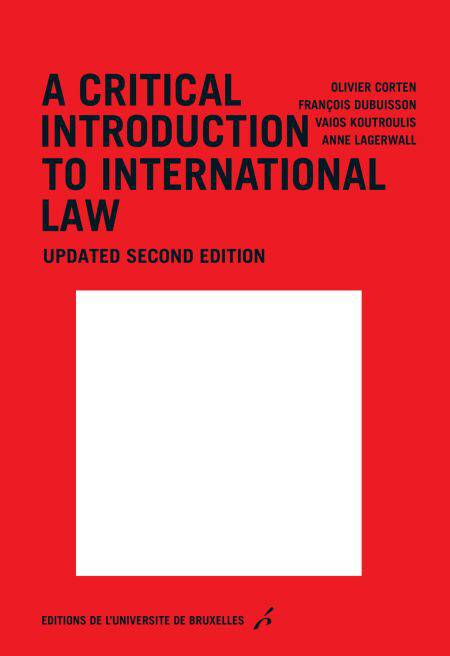
- Retrait gratuit dans votre magasin Club
- 7.000.000 titres dans notre catalogue
- Payer en toute sécurité
- Toujours un magasin près de chez vous
- Retrait gratuit dans votre magasin Club
- 7.000.0000 titres dans notre catalogue
- Payer en toute sécurité
- Toujours un magasin près de chez vous
A critical introduction to international law EBOOK
Updated second edition
Olivier Corten, François Dubuisson, Vaios Koutroulis
Ebook | Anglais
26,99 €
+ 26 points
Format
Description
Is international law universal? Can it be anything else than the will of the actors who are able to impose on others their values and interests? Beyond the strategic objectives that can be pursued – by a lawyer pleading before a court, a state representative operating in an international organization or addressing the general public, an author seeking recognition, or a citizen interested in the law – since international law cannot be interpreted objectively, can it at least be interpreted in a convincing and well-argued way? These are the questions that underlie this book, which, following a critical approach, emphasizes the profound ambivalence of international law.
International law appears to be torn between, in the one hand, the pursuit of a universalist ideal of justice and peace, and, on the other, the need to deal with power relations in a political context. From this perspective, it would be futile to claim to establish – and even less to discover – one single 'correct' interpretation of legal rules such as, for example, the right to self-determination, the principle of non-intervention or the prohibition of genocide. It is however possible to provide an overview of the main debates among states, other international actors or among legal scholars relating to the interpretation of the main rules of international law. In the book, these debates are illustrated by references to popular culture, in particular, music and films.
The ambition of this book is to enable the reader, on the basis of these elements, firstly to position himself or herself by selecting and defending the arguments that seem most convincing and secondly, and more fundamentally, to understand the legal and political terms of the controversies in international law.
This revised second edition includes updates in case law and practice, from the war in Ukraine to the war in Gaza, as well as legal developments related to climate change.
International law appears to be torn between, in the one hand, the pursuit of a universalist ideal of justice and peace, and, on the other, the need to deal with power relations in a political context. From this perspective, it would be futile to claim to establish – and even less to discover – one single 'correct' interpretation of legal rules such as, for example, the right to self-determination, the principle of non-intervention or the prohibition of genocide. It is however possible to provide an overview of the main debates among states, other international actors or among legal scholars relating to the interpretation of the main rules of international law. In the book, these debates are illustrated by references to popular culture, in particular, music and films.
The ambition of this book is to enable the reader, on the basis of these elements, firstly to position himself or herself by selecting and defending the arguments that seem most convincing and secondly, and more fundamentally, to understand the legal and political terms of the controversies in international law.
This revised second edition includes updates in case law and practice, from the war in Ukraine to the war in Gaza, as well as legal developments related to climate change.
Spécifications
Parties prenantes
- Auteur(s) :
- Editeur:
Contenu
- Langue:
- Anglais
Caractéristiques
- EAN:
- 9782800418940
- Date de parution :
- 08-10-24
- Format:
- Ebook
- Protection digitale:
- /
- Format numérique:
- ePub

Les avis
Nous publions uniquement les avis qui respectent les conditions requises. Consultez nos conditions pour les avis.






